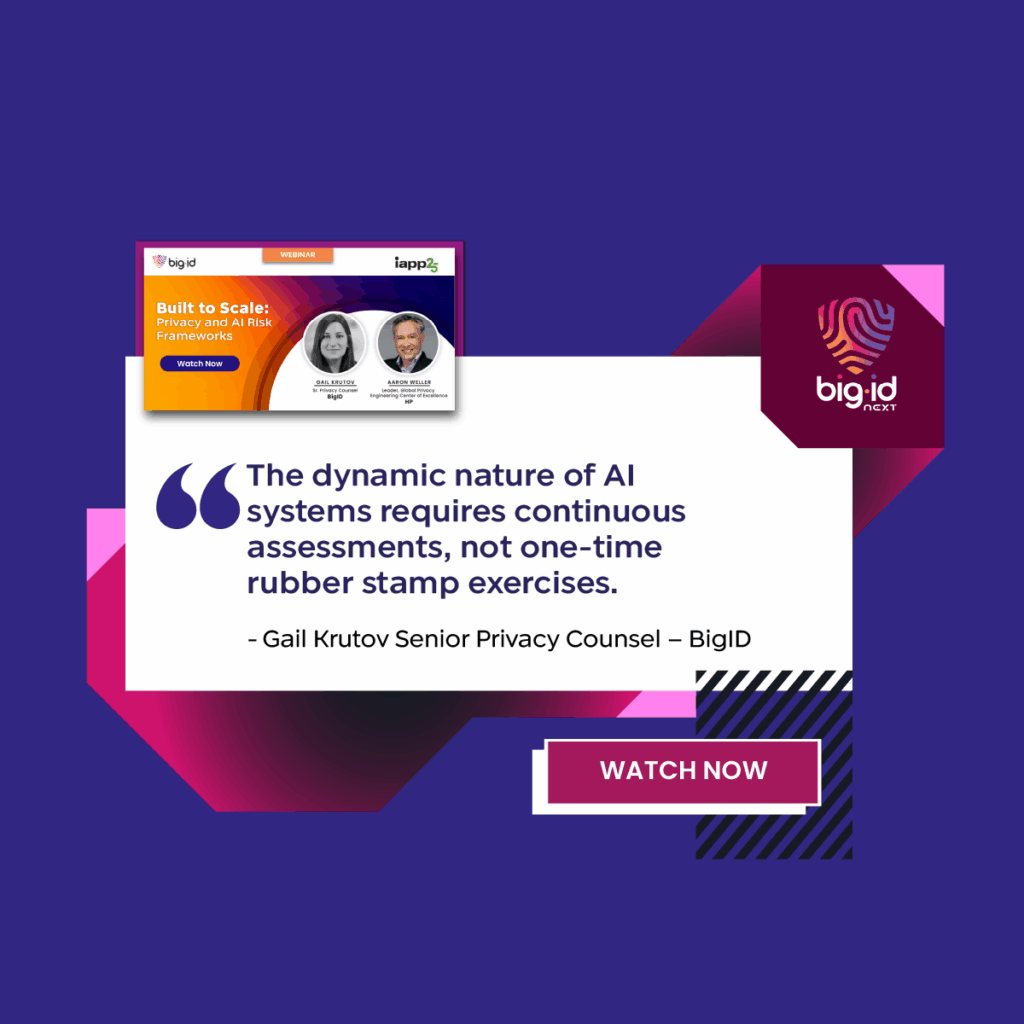Die Diskussion
Diese von Experten geleitete Sitzung konzentrierte sich auf die Schnittstelle zwischen Datenschutz und KI-GovernanceAaron Weller und Gail Krutov erläuterten die Komplexität der KI-Gesetze, -Rahmenbedingungen und die damit verbundenen ethischen Herausforderungen. Dieses Webinar richtete sich an Datenschutzexperten, Datensicherheitsverantwortliche und Innovationsmanager, die bereit sind, datenschutzorientierte Strategien zu entwickeln, um den Compliance- und Risikomanagementanforderungen der KI-Disruption in verschiedenen Branchen gerecht zu werden.
Die 3 wichtigsten Erkenntnisse
1. Anpassbare Datenschutzrahmen für KI
Traditionelle Datenschutzrahmen reichen nicht aus, um den neuen Risiken der KI zu begegnen. Unternehmen müssen Strategien entwickeln, um branchenspezifische Vorschriften, generative KI-Technologien, ethische Richtlinien und global unterschiedliche Compliance-Vorgaben zu berücksichtigen, wie beispielsweise die EU-KI-Gesetz und Chinas nationale Werteausrichtung für KI-Trainingsdaten.
2. Funktionsübergreifende Zusammenarbeit und skalierbare KI-Governance
KI-Governance erfordert Teamarbeit. Führungskräfte sollten die Bildung funktionsübergreifender Ausschüsse, die Erstellung von KI-Inventaren, die Abbildung von Datenflüssen und die Einführung maßgeschneiderter Schulungsprogramme priorisieren, um das Bewusstsein abteilungsübergreifend zu fördern. Die Förderung der Zusammenarbeit reduziert Silos, verhindert Überschneidungen und gewährleistet einen effizienten Risikoprüfungsprozess.
3. Proaktive Risikominderung durch Tools und Prozesse
Erfolgreiche KI-Risikoprogramme schaffen ein Gleichgewicht zwischen Innovation und Risiko. Durch den Einsatz praktischer Tools wie automatisiertes Code-Scanning für Datenschutzprobleme, Datenmapping für die Risikobewertung, Anbieter-Updates zu KI-Funktionen und ein Triage-System zur Risikopriorisierung können Unternehmen skalierbare, umsetzbare Strategien zur Risikominderung erstellen, die den regulatorischen Erwartungen entsprechen.
Deep Dive: Umfangsmanagement bei KI-Risikobewertungen
Ein kritisches Konzept, das diskutiert wurde, war das Problem der Funktionserweiterung in KI-Bewertung Prozesse. Laut Gail Krutov hilft die klare Definition der Genehmigungskriterien von Anfang an den Teams, „absegnende“ Überprüfungen zu vermeiden. Deshalb spielt Bildung eine entscheidende Rolle; Organisationen müssen Entscheidungsträger schulen in Grundsätze der KI-Governance um Konsistenz und Verantwortlichkeit zu gewährleisten.
Ein weiterer Aspekt, der den Umfang verbessert, ist die Nutzung von Vorwissen und Ressourcen zur Risikominimierung. Beispielsweise ermöglichen Deduplizierungsmaßnahmen Teams die Entwicklung von Governance-Prozessen basierend auf den Erfahrungen aus bestehenden KI-Projekten. Gleichzeitig tragen klare Verträge mit Anbietern sowie die Benachrichtigung und Prüfung neuer KI-Funktionen zu einer effektiven Kontrolle bei. Wie Aaron Weller betonte, geht es beim Risikomanagement nicht darum, „Nein“ zu Innovationen zu sagen, sondern darum, Teams innerhalb definierter Grenzen zu verantwortungsvollen „Ja“-Entscheidungen zu führen.
Denkwürdige Zitate
„Die dynamische Natur von KI-Systemen erfordert kontinuierliche Bewertungen, nicht einmalige Abnickübungen. Wir müssen über statische Konformität hinausgehen, um die Komplexität von KI zu bewältigen.“ – Gail Krutov
„Wir wollen die Wahrnehmung von Compliance-Teams verändern: von Gatekeepern zu Wegbereitern verantwortungsvoller Innovation – indem wir Teams dabei helfen, innerhalb definierter Leitplanken ‚Ja‘ zu sagen, anstatt einfach nur ‚Nein‘ zu sagen.“ – Aaron Weller
„Die Reduzierung von Doppelarbeit durch einen durchdachten Risikoprozess ermöglicht es Teams, sich auf Innovationen zu konzentrieren, ohne Kompromisse bei der Sicherheit einzugehen.“ – Gail Krutov
Schatten-KI existiert, weil es einfach ist, im Verborgenen zu agieren, insbesondere wenn Mitarbeiter glauben, nicht erwischt zu werden. Unser Ziel ist es, diese Diskussionen offen zu führen und einen Rahmen zu schaffen, dem die Menschen vertrauen. – Aaron Weller
Verwandte Ressourcen
- Lösungsübersicht: Verbinden Sie die Punkte in Daten und KI durch Governance, Kontext und Kontrolle
- Whitepaper: Datenschutz im Zeitalter der KI
- Whitepaper: Führen Sie verantwortungsvolle KI mit BigID Next ein
On-Demand ansehen oder aktiv werden
Haben Sie die Live-Diskussion verpasst? Sehen Sie sich das vollständige Webinar hier auf Abruf an
Möchten Sie erfahren, wie BigID Ihnen dabei helfen kann, diese gesetzlichen Anforderungen zu erfüllen? Fordern Sie noch heute eine personalisierte Demo an
Möchten Sie auf dem Laufenden bleiben? Abonnieren Sie unseren Newsletter →



